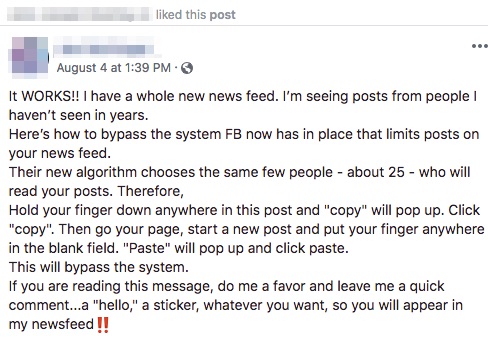Remember Certs? It was a candy mint. It was a breath mint. It was two! Two! Two mints in one!
The Facebook hoax du jour is like that: it’s a hoax about Facebook limiting your news feed to 26 people! It’s a hoax about users being able to copy and paste their way into a Whole New News Feed! It’s Two! Two! Two hoaxes in one!
Here are the hoax mongers’ instructions on how to dupe Facebook’s cursed (fictional) friend-limiting algorithm:

It WORKS!! I have a whole new news feed. I’m seeing posts from people I haven’t seen in years.
Here’s how to bypass the system FB now has in place that limits posts on your news feed.
Their new algorithm chooses the same few people – about 25 – who will read your posts. Therefore, I ask you all a favor so I can see your news feed and you can see mine.
Hold your finger down anywhere in this post and “copy” will pop up. Click “copy”. Then go your page, start a new post and put your finger anywhere in the blank field. “Paste” will pop up and click paste.
This will bypass the system.
The 26-friends-only algorithm hoax dates back to the beginning of the year, coming as it did on the heels of a real Facebook announcement from 11 January about a major overhaul in how Facebook’s newsfeed works.
The change wasn’t about squeezing out your friends, though. In fact, Facebook had the opposite in mind: squeezing businesses out of your news feed. The point was to get more personal content from friends and family into our news feeds, as opposed to corporate posts, be they from corporations, businesses or media.
Back in February, Facebook sent out a statement saying that there was nothing to the 25- or 26-friend limit:
Friends don’t let friends copy and paste memes, and this one simply is not true. We rank News Feed based on how relevant each post might be to you, and while we’ve made some updates that could increase the number of posts you see from your friends, your News Feed isn’t limited to 25 of them.
But still, the rumor went viral, lying its way to the top of news feeds, and even spinning off a variation that said that Snopes had confirmed the nonsense it was sputtering. Snopes, of course, did no such thing.
Besides trotting out the 26-friends hoax again, the current Facebook hoax uses a notion that just won’t die: that doing something in a post will affect how Facebook algorithms work.
That, of course, is just another breath of nonminty garbage. Copy-paste is not a magical algorithm-baffle sauce.
That “copy and paste this to affect Facebook’s technology” notion is similar to a related hoax that keeps popping up: the “copy and paste this to stop Facebook from legally using your photos” chain letter, as if there’s some legalese that subverts the company’s terms of service.
As we’ve said multiple times, there’s not.
Snopes has debunked all of these hoaxes. So has Facebook.
You can do your part by not copying, not pasting, and definitely not sharing this junk. If you do, you’re misleading friends and family, and teaching others that it’s OK to click without thinking.
By interacting with hoax posts, you push them closer to going viral. Unfortunately, that’s true even if the interaction is your comment on the post, telling others that it’s bilge water. It’s better to keep your clicks away from the hoax post and instead to contact the poster directly, gently educating them and asking that they remove the post so it doesn’t keep spreading.
Here are three more tips to avoid Facebook hoaxes.

nicolashesson
Not going to lie. I did post something similar and it has actually changed my news feed.bibdont think this is fully a hoax. Engagement is still a huge factor in the algorithm
mike@gmail.com
What exactly is it about a Facebook hoax, and the way this article has been written, that makes it “naked security” worthy and beneficial to the readers? I don’t see anything. I just see someone who probably spends more time on Facebook than is healthy.
PHYLLIS LANE
how do I fix it?
Joyce
Do I need to do anything special now that I’ve already done it ?
Doug Claar
I’ve seen a lot of articles explaining that this is a hoax, but none that answer the question of “why are people doing this?” Is it just to see if they can make it go viral?
I suppose only the creators of the posts know for sure. I can’t think of how someone would monetize this, but maybe I’m just not creative enough!
Paul Ducklin
I think you are right – people forward this sort of stuff “just because they can”.
I suspect that for some Facebook users, it feels like the kind of thing that is worth forwarding even if it only has a 1-in-10,000 chance of being true, because, hey, there’s no cost to anyone if it’s false – but imagine what an internet superhero they will be to their buddies if it turns out they were right!
Except that there *is* a cost to everyone, every time it’s forwarded, precisely because it’s so desensitisingly bogus…
Casy Barnes Boomershine
Some people use this as a way to target a gullible population for more insidious scams. If you are the type to copy-paste you might click on something else.
Patricia Miller
I would like to know why I only get posts from a “few” of my friends – the same friends all the time, while not getting posts from others. And I haven’t seen any business ads being filtered.